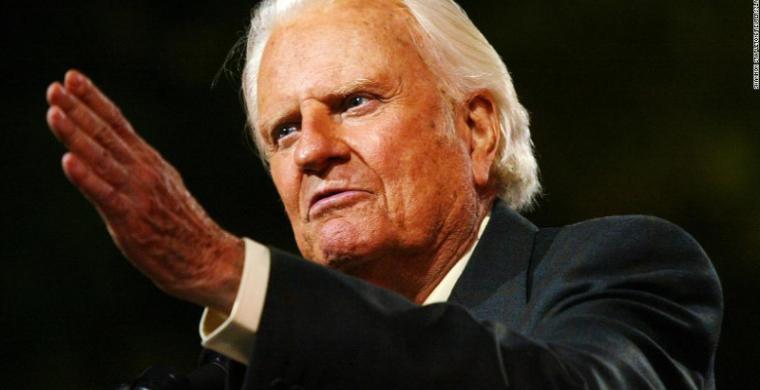The Death of an American Prophet
By Brian McGregor-Foxcroft
Special to VIRTUEONLINE
www.virtueonline.org
February 21, 2018
The Reverend Dr. William Franklin Graham has died at age 99. Did anyone feel the earth shake? You might well have done, for he was without a doubt the greatest ever American evangelist, whose spiritual reach encompassed the globe. From farm boy to Baptist preacher, he became one of the most influential movers and shakers in the Conservative Evangelical Movement. Because of his influence several important theological journals were established. Through his prompting and with his support several of the most influential theological schools, including my own, Regent College, were inspired and encouraged into existence.
My own memory of Billy Graham reaches back to my conversion in 1969. As a newly minted convert I was involved in several small local crusades. It was the thing to do, because he inspired people everywhere, in big centers and small towns to be concerned about the salvation of souls. So when the call went out for volunteers churches large and small mobilized their members to step up and get involved. Often those crusades seemed to be a little wooden and rigid in their organization, but things had to be so arranged that both the very prominent and the very humble participants might understand just what their role should be, and how each person might best use their skills to make the crusades a success. We were "all in" in those heady days of expectation.
I met Billy Graham, face to face, in 1983, during the World Council of Churches, which was convening at the University of British Columbia. It was really more a collision than a planned meeting. I recall that day as clearly as if happened just yesterday. I was charging out of the front door of Regent College, and as I opened the door, I ran smack into Billy Graham coming in. He was dressed in a trench coat and a cloth cap pulled down to his eyes. He was trying "not to look like Billy Graham," and I was making an attempt to "not notice that he was Billy Graham." We exchanged smiles and a few pleasantries as I stood aside to allow him entry. Even then he was a "big deal" around Regent College, and many in our student body had been converted through his ministry. Even in his later years he remained the elder statesman for the evangelical movement.
Billy Graham was following in the tradition of many great former evangelical preachers and teachers (too numerous to list here). But he seemed to be the culmination of a strong and reliable tradition of conservative Christian spokesman. Earlier great names in the movement looked to Billy Graham for spiritual and practical guidance when important decisions had to be made. Two notable examples might include the founding of Christianity Today Magazine and Fuller Seminary. But very many institutes, colleges, seminaries and mission ventures can claim Billy Graham as a solid supporter. His name alone was enough to raise much needed financial support for evangelical ventures in North America and elsewhere.
To say that Billy Graham was a genuine American prophet seems an understatement. He was the culmination of the whole evangelical milieu. His preaching had an extraordinary power to convict and convince. And so this moment seems right to re-evaluate the evangelical movement in the twenty-first century. If we use him as a yardstick, I think we must acknowledge that something has gone horribly wrong with the methods and the message of contemporary evangelism. Many were quick to claim their allegiance to Billy Graham and his message, but few there are today who can claim the same moral high-ground that he enjoyed. I remember so well the issue of financial accountability of evangelical organizations not so many years ago. While prominent evangelical preachers were reluctant to give an account of their incomes and their use of those incomes, Billy Graham was the first to come front and center, opening the books of the Billy Graham Evangelistic Association to public scrutiny. He believed in transparency in his ministry and his private life.
With his passing Billy Graham takes with him from the world an era long gone and never to return. There was innocence to the Billy Graham age, as we might call it, and its absence is already keenly felt by older Christian like me. As a formal life-long student of church history I lament the loss over the past few decades of some the finest evangelical leaders, teachers, and preachers, the likes of whom we shall not see again. And many of these were indebted to Billy Graham, while others were his mentors. Suddenly, there is a spiritual eclipse enveloping the church of Christ. Will the circle be unbroken? I fear it has been broken now that Billy Graham is no longer with us as our better spiritual conscience.
Brian McGregor-Foxcroft, is a graduate of the University of British Columbia, and Regent College.














